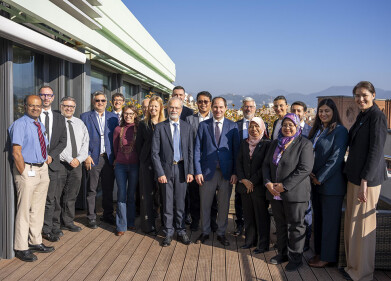Air clean up
Managing Air Quality in UK cities
May 17 2018
Blog (David Gilmour) - Population growth within UK cities has seen an increase in demand for infrastructure and associated services. Figures released from the Office of National Statistics suggest that, from mid-2011 to mid-2015, the average UK city had an average population increase of 3.4%, and the upward trend is set to continue in the coming decades.
The resulting environmental impact from this growth will see an increase in the levels of air pollution, which is projected to grow rapidly and compromises air quality through several sources. Indeed in a recent report some 47 towns and cities across the UK are at, or have exceeded, air pollution limits set by the World Health Organisation (WHO).
The demand for new housing and offices, as well as regeneration of older buildings and areas of contaminated land remediated through large scale construction projects, can reduce air quality. Excavation, demolition and building works can create conditions where elevated levels of particulates (dust) are generated from a concentrated area of activity, but can subsequently travel over wider areas and can be deemed a nuisance or hazard to neighbouring buildings, open areas and the general population.
Additionally, heavy volumes of road traffic especially those using diesel engines are under renewed scrutiny due to the ‘kerb-side’ impact to pedestrians, and the possibility of health implications. Measures are underway in many cities to identify problem areas, and implement measures to reduce traffic volumes and vehicle emissions to much lower levels than they are currently.
A survey conducted in late 2017 by the WHO, suggested that 44 out of 51 UK cities had elevated levels of PM2.5 particulates, with diesel engines from road vehicles being a major source of the these emissions.
As well as particulates being a known concern, other parameters such as combustion gases (carbon dioxide, carbon monoxide, nitrogen oxides and sulphur dioxides) also contribute to poor air quality within a city environment.
Local authorities have statutory duties for managing local air quality under the Environment Act 1995. They are required to carry out regular reviews and assessments of air quality in their area against standards and objectives prescribed in The Air Quality Standards Regulations 2010 and Air Quality Standards (Scotland) Regulations 2010 for the purpose of local air quality management. Where any of these objectives are not being achieved, authorities must designate air quality management areas and prepare and implement remedial action plans to tackle the problem. Similar targets are also set out at EU level, where there are called limit or target values. These target values are set out in the European 2008 Ambient Air Quality Directive (2008/50/EC).
SOCOTEC can assist in determining the air quality impact from various operations and processes to achieve compliance with current legislation. Our national coverage and extensive range of monitoring equipment enables a client focused approach which can be tailored to a wide variety of situations and locations.
Monitoring can be conducted using several recognised and approved methods, including the use of MCERTS certified real time data logging devices, diffusion tubes, and the deployment of dust deposition gauges.
Data logging devices can be deployed to obtain highly accurate particulate readings which identify any fluctuating particulate levels; these can be traced to specific operations or periods allowing targeted control measures to be put in place.
The use of dust deposition gauges allows for the evaluation of nuisance dust from mining, aggregate or construction works to the surrounding area and determines the impact as dust migrates off-site to the surrounding area.
The installation of diffusion tubes has been widely adopted across the UK for many years, to assess for air pollutants such as Nitrogen Dioxide. Being discreet and adaptable, this method is still recognised and recommended. Diffusion tubes are a passive sampler(they don’t require power) and are cost effective and easy to use.
With UKAS accredited laboratory analysis for both diffusion tubes and dust deposit gauges, our team of qualified scientists, technicians and laboratory staff can provide expert knowledge to clients and are able to guide them through the process of establishing a monitoring strategy, interpretation of monitoring results and technical advice to ensure compliance.
Events
Jan 12 2025 Abu Dhabi, UAE
Carrefour des Gestions Locales de L'eau
Jan 22 2025 Rennes, France
Jan 29 2025 Tokyo, Japan
Feb 05 2025 Nantes, France
Feb 16 2025 Kampala, Uganda














